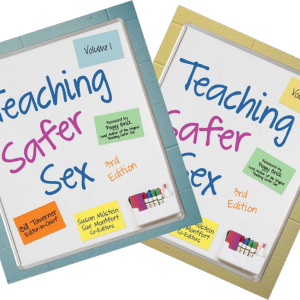 From Norway through Denmark and finally now to Germany!
From Norway through Denmark and finally now to Germany!
I come to Germany every summer because my mother lives here. I have a pretty good idea about the public campaigns around sexual health that are available for public viewing. In fact, I’ve loved talking about them with my kids as we’re wandering around the country, both in and out of tourist areas. Here are a few examples:

**”Sicher macht lustig!” translates loosely to “It makes it fun!”

**”Für meine Gesundheit.” translates to “For my health.”
And the tag line that runs through this campaign, “mach’s mit,” translates broadly to, “Do it with it.”
The International Encyclopedia of Sexuality has a section on Germany that includes a few short paragraphs on government policies and programs regarding sexuality education:
The parental family and the school have the mandate to give the necessary instructions about sexuality. To a certain degree, both institutions are reluctant to perform that task. They mutually suspect each other of being inefficient in advising and/or of being dangerous with respect to the contents. Sex education, if publicly discussed, immediately becomes a political controversy, where the right-left continuum corresponds to the poles of repressive versus emancipative doctrines.
School curricula provide for the instruction of sexual issues from the first elementary class onwards. Since there is no special course, the matter can be addressed in various fields, such as biology, religion, politics, and so on. The outcome, in spite of existing detailed syllabi, is a sporadic sex education. The teachers think of themselves as not being competent enough. As a matter of fact, the academic training is entirely insufficient; only a tenth of the pedagogic students are offered suitable courses. The parents’ attitudes are of a similar uncertainty. They hesitate to speak frankly to their children; and many parents wish that teachers would refrain from doing so (Glueck 1990).
It’s interesting to me how different this sounds from my experience of the public discourse about sex in Germany – which is so much more open than it is in the US.
What is it that makes someone, a parent or a teacher, feel comfortable talking about sexuality? Is it, as this quote suggests, training in the matter? Is it personal history where parents or peers or teachers somehow opened the doors to dialogue? Is it something that is inborn?
I do think that there is a great deal that can be learned through training someone to be a high quality sexuality educator. (And, frankly, 10% of the teachers receiving that kind of training is something that I feel we can only dream of in the US still!) But personal biography is also a huge part of the process. You have to have experienced dialogue about sexuality in order to lead a classroom about sexuality.
If you’re interested in reading about how people get into the field of sexuality education, about what makes it a pedogogical topic that people are comfortable with, I highly recommend How I Got Into Sex…Ed (and not just because I’m the editor! Promise!).
I ran off the tracks of German sex ed here…but I’m happy enough with where I ended up that I don’t want to go back! So here you are, with maybe a different blog post than you expected. But surprises are all part of the good game!





